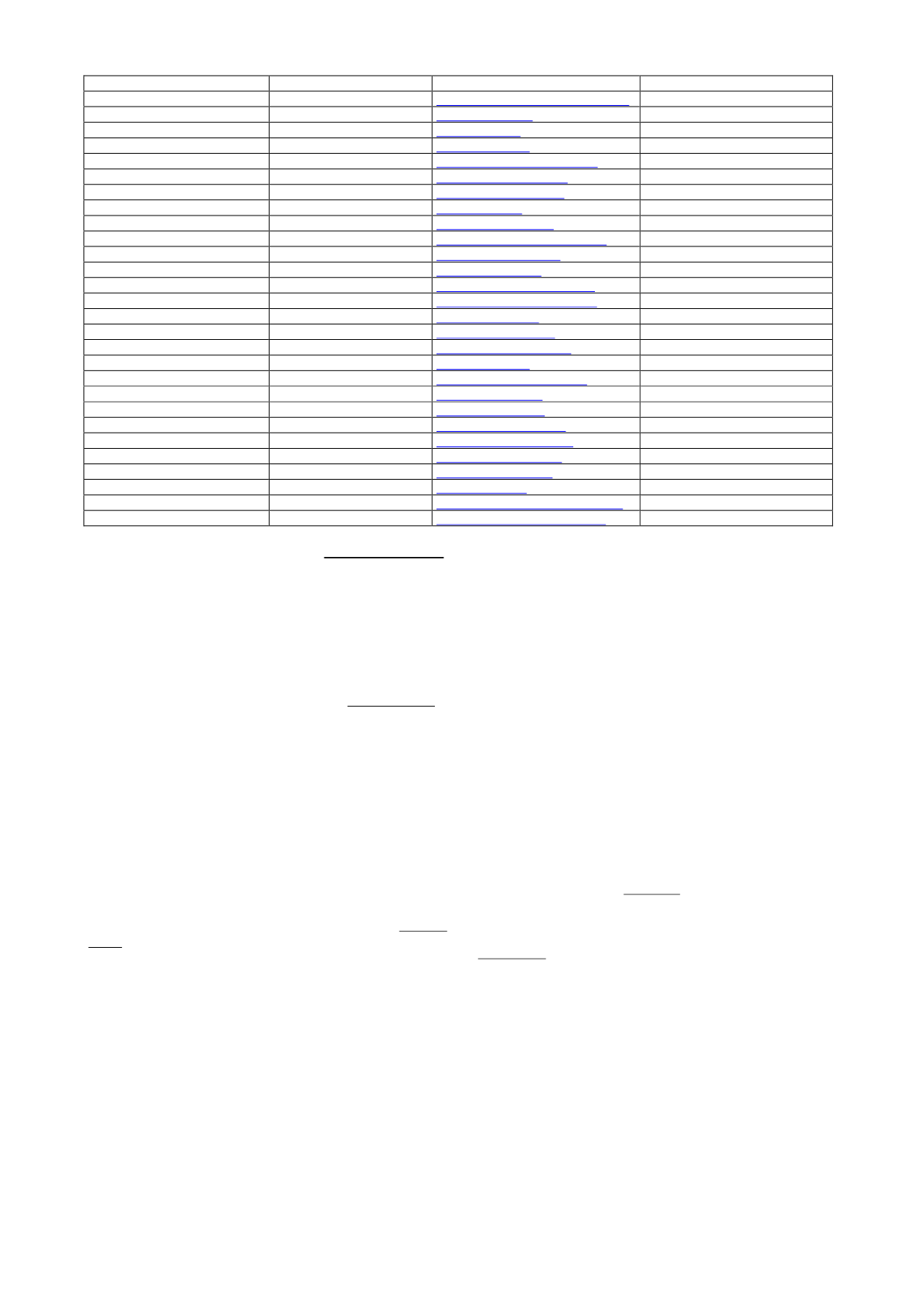

Name
Function
e-mail address
Country
Cosmin Chiorean
Member
cosmin.chiorean@mecon.utcluj.roRomania
Marcin Cudny
Member
mcud@pg.gda.plPoland
Marcio Muniz de Farias
Member
muniz@unb.brBrazil
V.P. Dyba
Member
saprosf@mail.ruRussia
Yasser El-Mossallamy
Member
y.el-mossallamy@arcadis.deEgypt
Keyvan Fotoohi
Member
Keyvanf@hotmail.comUSA
Antonio Gens
Member
antonio.gens@upc.eduSpain
Jürgen Grabe
Member
grabe@tuhh.deGermany
Michael Hicks
Member
m.a.hicks@tudelft.nlNetherlands
Minna Karstunen
Member
minna.karstunen@strath.ac.ukUK
S.W. Lee
Member
Lsw@gcgasia.com.hkHong Kong
R.E. Lukpanov
Member
rauan_82@mail.ruKazakhstan
Kenichi Maeda
Member
maeda.kenichi@nitech.ac.jpJapan
Diego Manzanal
Member
diego.manzanal@gmail.comArgentina
João Maranha
Member
jmaranha@lnec.ptPortugal
David Mašín
Member
masin@natur.cuni.czCzech & Slovak Republics
Philippe Mestat
Member
philippe.mestat@lcpc.frFrance
Pablo Mira
Member
pmira@cedex.esSpain
Toshihiro Noda
Member
noda@civil.nagoya-u.ac.jpJapan
Achilleas Papadimitriou
Member
apapad@civ.uth.grGreece
K. Rajagopal
Member
gopalkr@iitm.ac.inIndia
Ricardo Schiava
Member
rschiava@arnet.com.arArgentina
Mohamed Shahin
Member
m.shahin@curtin.edu.auAustralia
Oliver Stelzer
Member
oliver.stelzer@baw.deGermany
Donatella Sterpi
Member
sterpi@stru.polimi.itItaly
Claudio Tamagnini
Member
tamag@unipg.itItaly
L. Vincke
Member
leen.vincke@mow.vlaanderen.beBelgium
Ting Zhang
Member
ting.zhang@woodside.com.auAustralia
ISSMGE Technical Committee TC103 - Terms of References
TC103 Numerical Methods in Geomechanics is one of the
technical committees of International Society for Soil Mechan-
ics and Geotechnical Engineering (ISSMGE). TC103 aims to
provide a forum for all interested members of ISSMGE to
explore the using of computational tools and developing of
advanced numerical methods to solve problems relevant to soil
mechanics and geotechnical engineering.
TC103 will deal with the following important technical issues:
a)
Constitutive modelling, calibrations of complex soil behav-
iour and engineering problems such as instability, strain
localization and progressive failure of soil or rock struc-
tures;
b)
Advanced procedures for model validation and verification;
c)
the development of accurate, robust and efficient numerical
methods for applications of varying needs;
d)
Modelling of coupled phenomena that are useful across
geotechnical engineering, rock engineering, petroleum
engineering, geothermal engineering;
e)
Assisting and promotion of exchange of knowledge be-
tween the academia and practicing engineers.
More specifically, TC103 will focus on the following thematic
topics relevant to soil mechanics and geotechnical engineering:
a)
Investigation on effective predictive approaches to better
understanding of coupled behaviour in geomaterials (such
as thermo-hydro-chemo-mechanical coupling), various in-
stabilities modes such as strain localization, liquefaction,
large deformation, underground water flow and contamina-
tion, erosion and rapid flow in geomaterials, thermo-related
geomechanics;
b)
Development of advanced constitutive models to characterize
the complex behaviour of geomaterials, including elasto-
plasticity, visco-plasticity, hypoplasticity, cyclic-plasticity,
soil/rock degradation, strain softening, rate-dependency and
anisotropy;
c)
Development of advanced predictive tools based on new
numerical and analytical techniques, such as Finite Element
Method (FEM), Extended Finite Element Method (X-
FEM), Boundary Element Method (BEM), Material Point
Method (MPM), coupled Discrete Element Method (DEM)
and FEM, Moving Particle Semi-implicit (MPS) method,
Smoothed Particle Hydrodynamics (SPH) method and
Multiscale Modelling (MM) method.
d)
Numerical implementation and calibration of advanced soil
models using laboratory and field testing data; determina-
tion of model parameters using back analysis and homo-
genization of locally heterogeneous geomaterials.
e)
Critical evaluation of existing prediction approaches among
the empirical methods, laboratory testing, simple elastic
and/or elasto-plastic methods and limit analysis and various
comprehensive numerical methods.
f)
Transfer of new knowledge to and training practicing engi-
neers of the ISSMGE to address important engineering
issues in dealing with natural hazards; promotion of
exchange of ideas and experience between academics and
practitioners.
Over a term of four years from 2010 to 2013, TC103 will strive
to achieve the following objectives in line with the aforemen-
tioned major themes as well as the guideline provided by the
Technical Oversight Committee (TOC):
Objective 1
:
Disseminate knowledge and practice to the member of
ISSMGE on employing advanced numerical methods to facili-
tate deeper understanding of fundamental behaviour of
geomaterials and to help solving difficult problems that are of
practical importance. In doing so, TC103 will
a)
Organize or co-organize relevant workshops/symposiums/
conferences to encourage the exchange of ideas and
advances in computational geomechanics among academics
and practitioners. Specifically, the following conferences/
workshops have been tentatively identified as the occasions
that special sessions and/or mini-symposiums will be
planned under the name of ISSMGE TC103
Volume 6 - Page 163









